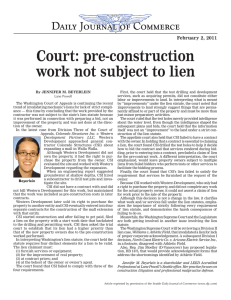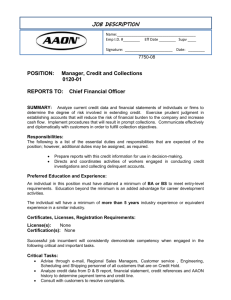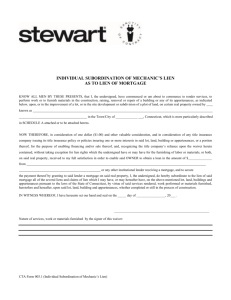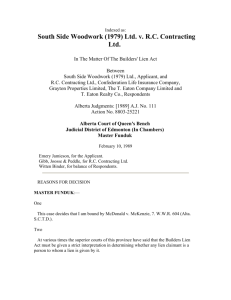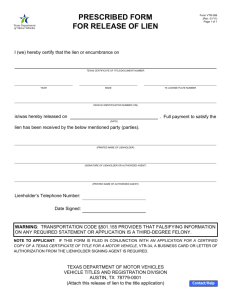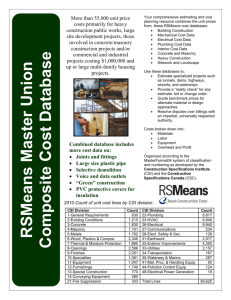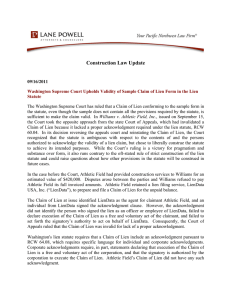Washington Appellate Court Rules Pre-Construction Work is Not Subject to Lien
advertisement
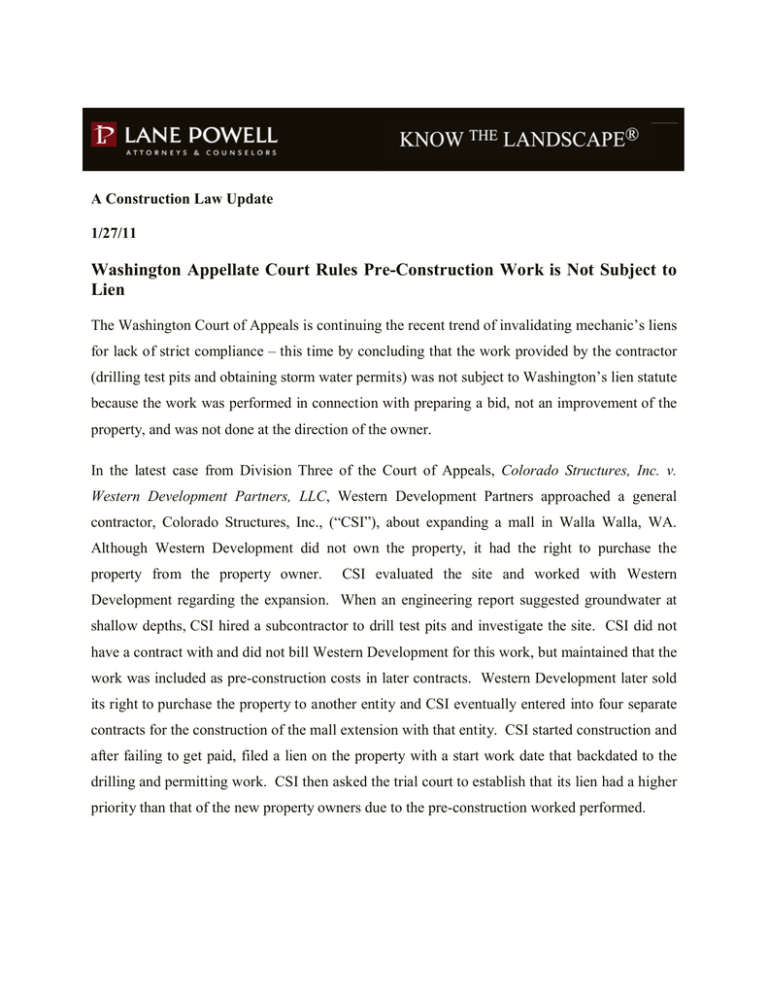
A Construction Law Update 1/27/11 Washington Appellate Court Rules Pre-Construction Work is Not Subject to Lien The Washington Court of Appeals is continuing the recent trend of invalidating mechanic’s liens for lack of strict compliance – this time by concluding that the work provided by the contractor (drilling test pits and obtaining storm water permits) was not subject to Washington’s lien statute because the work was performed in connection with preparing a bid, not an improvement of the property, and was not done at the direction of the owner. In the latest case from Division Three of the Court of Appeals, Colorado Structures, Inc. v. Western Development Partners, LLC, Western Development Partners approached a general contractor, Colorado Structures, Inc., (“CSI”), about expanding a mall in Walla Walla, WA. Although Western Development did not own the property, it had the right to purchase the property from the property owner. CSI evaluated the site and worked with Western Development regarding the expansion. When an engineering report suggested groundwater at shallow depths, CSI hired a subcontractor to drill test pits and investigate the site. CSI did not have a contract with and did not bill Western Development for this work, but maintained that the work was included as pre-construction costs in later contracts. Western Development later sold its right to purchase the property to another entity and CSI eventually entered into four separate contracts for the construction of the mall extension with that entity. CSI started construction and after failing to get paid, filed a lien on the property with a start work date that backdated to the drilling and permitting work. CSI then asked the trial court to establish that its lien had a higher priority than that of the new property owners due to the pre-construction worked performed. In interpreting Washington’s lien statute, RCW 60.04.021, the court held that the statute requires four distinct elements for a lien to be valid – the lien claimant must: (1) furnish services or equipment; (2) for the improvement of real property; (3) at contract prices; and (4) at the behest of the owner or owner’s agent. The court found that CSI failed to comply with three of the four requirements. First, the court held that the test drilling and development services, such as acquiring permits, did not constitute either labor or improvements to land under the lien statute. In interpreting what is meant by “improvements” under RCW 60.04.011(5), the court noted that improvements to land strongly suggest things that are permanently affixed to or part of the property and must be more than just minor preparatory activities. The court ruled that the test holes merely provided intelligence about water level. Even though the intelligence shaped the subsequent plans and bids, the court held that the information itself was not an “improvement” to the land under a strict construction of the lien statute. The court then held that CSI also failed to have a contract with the owner. In holding that a contract is essential to claiming a lien, the court found CSI drilled the test holes to help it decide how to bid the contract and that services rendered during bidding, prior to entering into a contract, precluded a claim of lien for the pre-contract work. A different interpretation, the court emphasized, would leave property owners subject to multiple liens from failed bidders who perform tests or other services to facilitate the bidding process. Finally, the court found that CSI’s lien failed to satisfy the requirement that services be furnished at the request of the owner. Because CSI worked with Western Development, who only had a right to purchase the property and did not complete any work for the actual property owner, it could not assert a claim of lien for work prior to the sale of the property. Although this decision is not a change in the law, it clarifies what work and/or services fall under the lien statutes, emphasizes the importance of strictly following every requirement of the lien statute, and demonstrates the harsh consequences of failing to do so. 2 Meanwhile, the Washington Supreme Court and the Legislature are both getting involved in another issue involving the lien statute. The Washington Supreme Court will be reviewing a Division II lien case, Williams v. Athletic Field, that invalidated a lien for lack of proper corporate acknowledgement. A subsequent Division I decision, North Coast Elec. Co. v. Arizona Elec. Service., Inc., in a footnote, disagreed with Athletic Field. Also, Rep. Jim Moeller (D-Vancouver) has proposed legislation, HB 1475, that would provide acknowledgement forms that address the shortcomings identified by Athletic Field. For more information, please contact the Construction Law Practice Group at Lane Powell: 206.223.7000 Seattle 503.778.2100 Portland lppc@lanepowell.com www.lanepowell.com We provide the Construction Law Hotsheet as a service to our clients, colleagues and friends. It is intended to be a source of general information, not an opinion or legal advice on any specific situation, and does not create an attorney-client relationship with our readers. If you would like more information regarding whether we may assist you in any particular matter, please contact one of our lawyers, using care not to provide us any confidential information until we have notified you in writing that there are no conflicts of interest and that we have agreed to represent you on the specific matter that is the subject of your inquiry. Copyright © 2011 Lane Powell PC Seattle - Portland - Anchorage - Olympia - Tacoma - London 3
